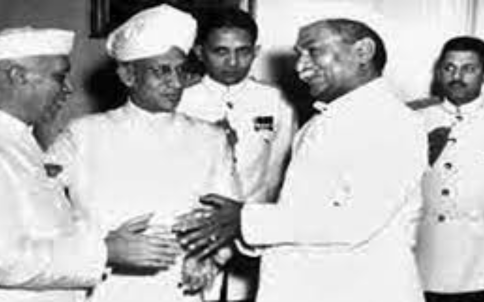Dr.Madabhushi Sridhar Acharyulu, Mahindra University

PIB Photo: B.R. Ambedkar who spearheaded the drafting of the Indian Constitution, was an admirable jurist, reformer, and intellectual. Here he is seen with Jawaharlal Nehru.
| Our nation is gears up for a grand 75th Republic Day, January 26, 2024. The nation will commemorate the adoption of its Constitution in 1950 and the dawn of its democratic republic, highlighting India’s rich cultural heritage and traditions, progress and achievements. |
Dr. Rajendra Prasad, a great lawyer who headed the Constitutional Assembly, good advocacy was proved and the Constitution was upheld with the interference of the CJI. First President of India, earlier, it was the Chairman of the Constituent Assembly Rajendra Prasad is instrument in shaping the Indian nation as the Indian Constitution.
Our free India achieved long cherished INDEPENDENCE from the British Raj on 15 August 1947 following the success of the Indian independence movement. The independence came through the Indian Independence Act 1947, an Act of the Parliament of the United Kingdom. The tragedy was that the nation was partitioned by British India into the two new independent Dominions of the British Commonwealth (later Commonwealth of Nations).
Once it was a great nation, but dominated as small a dominion, which later bloomed into a republic separate from British Raj.It was under the constitutional monarchy with George VI as head of state and the Earl Mountbatten as governor-general. At that time there was permanent Indian Constitution. The Monarchy was using laws based on the modified colonial Government of India Act 1935.The critique calls that the the Government of India Act 1935 was just reformed into built as the governing document of India.
Dr Ambedkar is surely its architect but the Rajendra Prasad who was responsible for conducting the Assembly and efficient personality in facilitating the construction of republic nation. It is not unreasonable to forget the Rajendra Prasad, the Bharath Ratna, a simple common man.
His birthday generally is #AdvocatesDay. In his guidance, discuss the clients not just about their legal fraternity. They should believe in a fraternity of people, not just lawyers.
Dr Rajendra Prasad is a follower of Mahatma Gandhi, a very active independence fighter, lawyer, scholar, and then the first President of India, in office from 1950 to 1962. His birth anniversary of Rajendra Prasad (3 December 1884 – 28 February 1963).

Wikimedia Commons: A Constituent Assembly of India meeting. B.R. Ambedkar can be seen seated top-right.
Advocates have been instrumental in spearheading movements in the society for a positive change. In modern times lawyers in various countries have given leadership to their nations. In the great American and French Revolutions many of the leading figures were lawyers. Abraham Lincoln, the great American President during the American Civil War was a lawyer, and so was Robespierre, the great French leader during the French Revolution, Lenin, the great leader of the Russian Revolution of 1917 was a student of law. Prominent freedom fighters belonged to the legal fraternity and played a leading part in the framing of our Constitution. Gandhiji, Pandit Nehru, Dr. Ambedkar, Alladi Krishnaswami Iyer, and K.M. Munshi to mention just a few. Lawyers gave up their practice to join the freedom movement and many of them went to jail.
Rajendra Prasad was imprisoned during the Salt Satyagraha of 1931 and the Quit India movement of 1942. After the 1946 elections, Prasad served as an important Minister in the central government. In 1947, Prasad was elected as President of the Constituent Assembly of India, which prepared the Constitution of India and served as its provisional parliament. Prasad was elected its first president by the Constituent Assembly.
Although a ceremonial head of state, Prasad encouraged the development of education in India and advised the Nehru government on several occasions.
In 1957, Prasad was re-elected to the presidency, becoming the only president to serve two full terms. He died on 28 February 1963, aged 78. He was awarded the Bharat Ratna, the nation’s highest civilian award. All the collective of lawyers should work to save the rule of law. We need to remember the heroes of the Constitution.
On November 25, 1949, Dr Ambedkar cautioned about the potential and pitfalls of life after January 26, 1950:
On the 26th of January 1950, we are going to enter into a life of contradictions. In politics we will have equality and in social and economic life we will have inequality. In politics we will be recognising the principle of one man one vote and one vote one value.
From “One man one vote and one vote one value” where do we go?

Wikimedia Commons: British Prime Minister Ramsay MacDonald to the right of Mahatma Gandhi at the Second Round Table Conference in London, October 1931. Fourth from the left in the foreground is Dr. B. R. Ambedkar, representative of the “Depressed Classes.”




